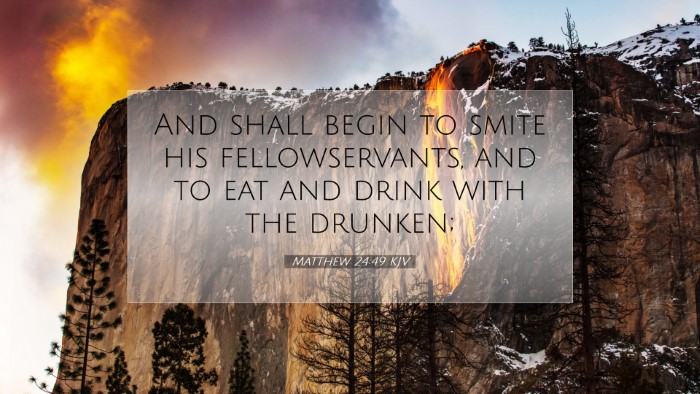Commentary on Matthew 24:49
Verse Text: "And shall begin to smite his fellowservants, and to eat and drink with the drunken;" (Matthew 24:49, KJV)
Introduction
The verse Matthew 24:49 is a part of Jesus' Olivet Discourse, where He addresses His disciples about the end times and the nature of vigilance in the face of impending judgment. This verse presents a warning against unfaithfulness and carelessness among servants of God. In this commentary, we shall explore insights gathered from renowned public domain commentaries to reflect on the implications of this verse.
Contextual Background
Matthew 24 is a profound chapter focusing on eschatological teachings. Jesus prophesies about the destruction of the Temple, signs of the end of the age, and emphasizes the importance of being watchful and faithful. This particular verse draws attention to the behavior of a servant in a parable context set by Jesus, reflecting the condition of individuals who are entrusted with responsibilities in the Kingdom of God.
Analysis of the Text
1. The Nature of the Servant's Actions
The servant in this verse symbolizes any individual who has been given a stewardship role in God's Kingdom. Matthew Henry notes that the servant is guilty of both neglect and abuse of his responsibilities. Instead of faithfully overseeing his fellow servants, he begins to “smite” them, indicative of oppression and harshness, a behavior that deviates from the expected conduct of a faithful steward.
2. Eating and Drinking with the Drunken
This phrase underscores a lack of discernment and moral decay. Albert Barnes suggests that the act of eating and drinking with those who are drunken illustrates a deeper spiritual malaise. The servant not only neglects his duties but also engages in debauchery, aligning himself with those who are careless and indulgent—representative of a society that has forsaken vigilance and holiness.
3. The Implications of Unfaithfulness
Adam Clarke highlights that this verse serves as a caution for all believers regarding the importance of faithfulness. There is a stark contrast between the faithful servant, who is watchful and diligent, and the unfaithful servant, whose actions can lead to dire consequences. The prophetic tone warns that such behavior will not go unnoticed, as the master shall return to reckon with His servants.
Theological Insights
1. The Call to Vigilance
This verse is not merely a historical reference; it has ongoing relevance. It urges pastors and leaders within the church to remain vigilant against the lure of complacency and moral compromise. Matthew Henry points out that leaders are called to nurture and guide their congregations. When they fail, they lead others astray, much like the servant who mistreats his fellow servants.
2. The Danger of Complacency
This passage serves as an admonition against spiritual complacency. Barnes remarks that the neglect of duty, which can lead to indulgent behavior, often goes hand-in-hand with the abandonment of faith. It is a spiritual progression that erodes the soul, warning us that staying spiritually engaged is crucial.
3. Accountability Before God
There is an underlying theme of accountability woven throughout this passage. Clarke emphasizes that God will eventually hold His servants accountable for their actions. The unfaithful servant's behavior will not only affect himself but will also have consequences for those entrusted to his care. The metaphorical language implies that the return of the master signifies the inevitable day of reckoning.
Applications for Today
In practical application, Matthew 24:49 encourages a self-examination of one’s spiritual life:
- Self-Reflection: Pastors, theologians, and students must regularly assess their spiritual health and stewardship. Are we prioritizing holy living and diligent service?
- Community Responsibility: This verse reminds us of our responsibilities toward one another; how do we treat fellow servants of the faith?
- Watchfulness: The necessity of being watchful cannot be overstated. We must remain alert to the challenges of complacency that can infiltrate not only our hearts but also our communities.
Conclusion
Matthew 24:49 serves as a powerful reminder of the standards expected of those called to serve within the body of Christ. Through the reflections offered by Henry, Barnes, and Clarke, we gain a multifaceted understanding of the dangers of unfaithfulness and the importance of vigilance. As we study this text, may we be inspired to lead lives that honor God, embracing the gravity of our roles as stewards in His Kingdom.


